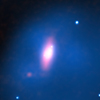CXC Home | Search | Help | Image Use Policy | Latest Images | Privacy | Accessibility | Glossary | Q&A
Tour of NGC 4342 & NGC 4291:
Quicktime MPEG
Astronomers think that just about every galaxy has a giant black hole at its center. For quite some time, the prevailing wisdom has been that the mass of these supermassive black holes is tied to the size of the tightly packed group of stars around the galaxy's center known as its bulge. Two objects, however, have been discovered that are challenging this idea. NGC 4342 and NGC 4291 are relatively nearby galaxies, which means astronomers can get particularly good views of them. New data from NASA's Chandra X-ray Observatory revealed the presence of massive envelopes of dark matter around each galaxy. The researchers think the growth of the supermassive black holes may, in fact, be tied more closely to the amount and distribution of the dark matter in each galaxy, rather than the mass of stars contained in their bulges as previously believed.
[Runtime: 00:57]
Quicktime MPEG
Astronomers think that just about every galaxy has a giant black hole at its center. For quite some time, the prevailing wisdom has been that the mass of these supermassive black holes is tied to the size of the tightly packed group of stars around the galaxy's center known as its bulge. Two objects, however, have been discovered that are challenging this idea. NGC 4342 and NGC 4291 are relatively nearby galaxies, which means astronomers can get particularly good views of them. New data from NASA's Chandra X-ray Observatory revealed the presence of massive envelopes of dark matter around each galaxy. The researchers think the growth of the supermassive black holes may, in fact, be tied more closely to the amount and distribution of the dark matter in each galaxy, rather than the mass of stars contained in their bulges as previously believed.
[Runtime: 00:57]
(Credit: NASA/CXC/A. Hobart)
Return to NGC 4342 & NGC 4291 (June 11, 2012)



